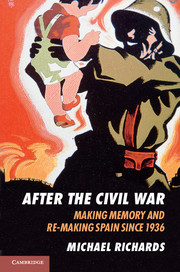Crossref Citations
This Book has been
cited by the following publications. This list is generated based on data provided by Crossref.
Canal, Jordi
Baby, Sophie
Luis, Jean-Philippe
Michonneau, Stéphane
and
Yusta, Mercedes
2014.
Histoire de l'Espagne contemporaine.
p.
305.
Quiroga, Alejandro
2014.
The three spheres. A theoretical model of mass nationalisation: the case of Spain.
Nations and Nationalism,
Vol. 20,
Issue. 4,
p.
683.
Sabido, Ruth M. Sanz
2016.
Memory in a Mediated World.
p.
142.
Larson, Jared D.
2016.
Migration in 21st-century Iberia: the politics and patterns of anti-immigrantism and emigration.
p.
115.
2017.
Modern Spain.
p.
314.
2017.
Histoire de l'Espagne contemporaine.
p.
307.
Domingo, Irene
2017.
Remembering Paco Ibáñez at the Olympia: A political communitas in exile.
Journal of European Studies,
Vol. 47,
Issue. 3,
p.
259.
Rigney, Ann
2018.
Remembrance as remaking: memories of the nation revisited.
Nations and Nationalism,
Vol. 24,
Issue. 2,
p.
240.
Ribeiro de Menezes, Alison
2018.
Public Humanities and the Spanish Civil War.
p.
115.
Quílez Esteve, Laia
and
Rueda Laffond, José Carlos
2019.
Narratives of memory in commemorative Spanish documentaries about the democratic transition:Adolfo Suárez. Mi historiaandBucarest, la memoria perdida.
Memory Studies,
Vol. 12,
Issue. 2,
p.
198.
Thompson, John Patrick
2019.
Pinta Pasado, Crea Futuro: a new approach for remembering the Second Republic, the Civil War, and the Franco dictatorship.
Journal of Iberian and Latin American Studies,
Vol. 25,
Issue. 3,
p.
343.
Aldana Reyes, Xavier
2020.
The New Urban Gothic.
p.
237.
Stucki, Andreas
2020.
Introduction: Violence, Migration, and Gender in the Portuguese- and Spanish-Speaking World, 1945–2019.
Itinerario,
Vol. 44,
Issue. 1,
p.
18.
Villamil, Francisco
2021.
Mobilizing memories: The social conditions of the long-term impact of victimization.
Journal of Peace Research,
Vol. 58,
Issue. 3,
p.
399.
Baquero, Rafael Pérez
2021.
Rethinking collective trauma in the 20th century: Memory, victimhood and the temporality of the Spanish Civil War.
Psychoanalysis, Culture & Society,
Vol. 26,
Issue. 1,
p.
99.
Aldana Reyes, Xavier
2021.
Spanish Civil War Horror and Regional Trauma.
English Language Notes,
Vol. 59,
Issue. 2,
p.
20.
Hernández Burgos, Claudio
2021.
Nationalisation, banal nationalism and everyday nationhood in a dictatorship: The Franco regime in Spain.
Nations and Nationalism,
Vol. 27,
Issue. 3,
p.
690.
Rojas, Hugo
2022.
Past Human Rights Violations and the Question of Indifference: The Case of Chile.
p.
37.
López Fuentes, Julia
2022.
“A Forgetting for Everyone, by Everyone”? Spain’s Memory Laws and the Rise of the European Community of Memory, 1977–2007.
The Journal of Modern History,
Vol. 94,
Issue. 1,
p.
127.
Martínez, Michael L.
2023.
‘¡La Vaguada es nuestra!’: The Cultural Politics of Madrid’s First Shopping Mall.
Romance Quarterly,
Vol. 70,
Issue. 3,
p.
151.





